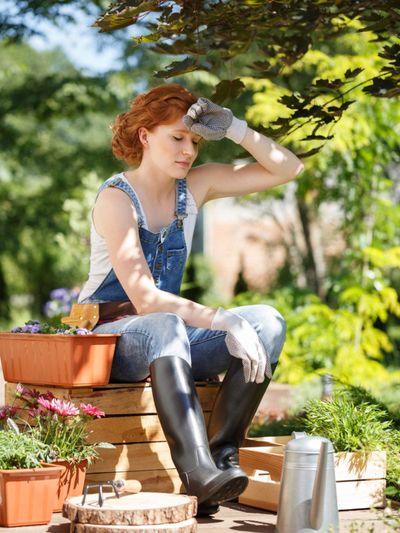Heat Wave Garden Safety
Many of us have read the awful stories of student athletes that die of heat stroke. It is a serious risk even for healthy, active individuals. Those of us who love gardening can’t wait to get out on a sunny day and play in our landscapes, but take some precautions before going out in the heat. Gardening in a heat wave can do more than exhaust you; it can cause a trip to the hospital. Your clothing choice and other items on your body are the first step to protecting yourself when gardening in a heat wave. Wear light colors that don’t draw in heat and fabric that breathes, like cotton. Your clothing should be loose and allow for air flow. Put on a wide brimmed hat to shield your head, neck, and shoulders from the sun. The effects of UV exposure on skin are well documented. Put on an SPF 15 or higher 30 minutes before you go outside. Reapply as the product directs or after heavily perspiring.
How to Stay Cool in the Garden
A cold beer or rewarding chilled rosé sound like just the thing after hot exertion, but watch out! Alcohol actually causes the body to lose fluids, as do sugary and caffeinated drinks. Garden heat safety experts recommend sticking with water, and plenty of it. Cool, not iced, water is most effective to regulate your temperature. Drink two to four 8-ounce glasses of water per hour when gardening in a heat wave. Do not wait until you are thirsty to rehydrate, as this is often too late. Eat small meals but more frequently. Avoid hot foods and replace minerals and salts.
Tips on Gardening in a Heat Wave
First of all, don’t expect yourself to get as much done in extreme heat. Pace yourself and pick projects that don’t overly exert the body. Try to work in the morning or evening when temperatures are at their coolest. If you are not acclimated to the heat, spend short periods outdoors and come to a cool location to rest frequently. If you are short of breath or feel too hot, cool off in a shower or sprinkler and rest in a shady area while taking in fluids. Gardening in the heat is often necessary. After all, the lawn won’t mow itself. However, taking precautions to do so safely can keep you from getting sick and ruining your summer.
